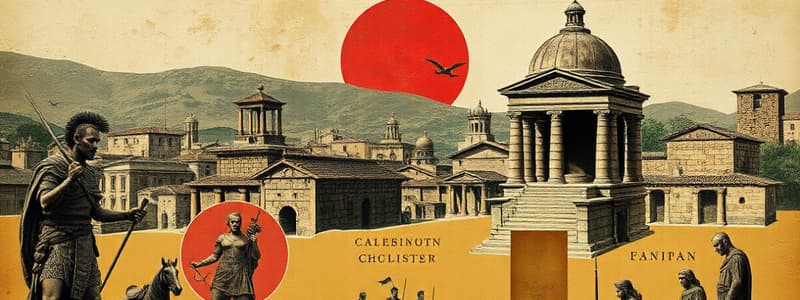Podcast
Questions and Answers
What was the primary reason for the start of the Punic Wars?
What was the primary reason for the start of the Punic Wars?
- Allegiance with Greek city-states
- Religious conflicts
- Control of trade in the western Mediterranean (correct)
- Territorial expansion in the eastern Mediterranean
Hannibal is known for his role in the First Punic War.
Hannibal is known for his role in the First Punic War.
False (B)
What did Rome gain as a result of the First Punic War?
What did Rome gain as a result of the First Punic War?
Sicily and other islands
The Third Punic War ended in _____ B.C.E.
The Third Punic War ended in _____ B.C.E.
Match the following events with their corresponding outcomes:
Match the following events with their corresponding outcomes:
Flashcards are hidden until you start studying
Study Notes
Overview of the Punic Wars
- Between 264 B.C.E. and 146 B.C.E., Rome engaged in three major conflicts known as the Punic Wars against Carthage.
- Carthage was a dominant city-state in North Africa, controlling significant territories including North Africa, most of Spain, and parts of Sicily, as well as trade in the western Mediterranean.
First Punic War
- Initiated in 264 B.C.E., it predominantly occurred at sea.
- Carthage possessed a powerful navy; however, Romans were able to develop their own fleet by adapting Carthaginian ship designs.
- A significant naval victory in 241 B.C.E. led to Rome's control of Sicily and nearby islands.
Second Punic War
- Commenced 23 years later, initiated by Carthaginian aggression towards Italy.
- Hannibal, a prominent Carthaginian general, executed a surprising military campaign by taking his army from Spain through the Alps into Italy in 218 B.C.E.
- Hannibal's forces, including elephants, faced harsh conditions for 15 years, battling the Romans.
- In 202 B.C.E., Hannibal returned to defend Carthage, ultimately being defeated, which ended this war.
- Carthage surrendered Spain to Rome and was obligated to pay large reparations.
Third Punic War
- Followed a prolonged peace of approximately 50 years, prompted by Roman Senator Cato's call for Carthage’s total destruction.
- Lasted three years, culminating in 146 B.C.E., when Rome completely razed Carthage.
- Many Carthaginians were killed, and survivors were enslaved, cementing Rome's supremacy across the Mediterranean.
Consequences of the Punic Wars
- Expansion of Roman power resulted in vast territorial gains, including North Africa, significant parts of Spain, Macedonia, and Greece.
- High human cost: numerous Roman and local men perished, and civilians in conquered regions faced substantial losses in population and property.
- Agricultural devastation occurred as farms were destroyed or neglected, leading to reliance on imported grain from Sicily and elsewhere.
- Shift from small farms to large estates owned by wealthy landowners, who capitalized on new wealth from conquests to grow lucrative crops.
- Cultural infusion as wealth and enslaved individuals brought Greek customs and architectural styles into Roman society. Wealthy Romans endeavored to construct Greek-inspired villas and temples.
Studying That Suits You
Use AI to generate personalized quizzes and flashcards to suit your learning preferences.




